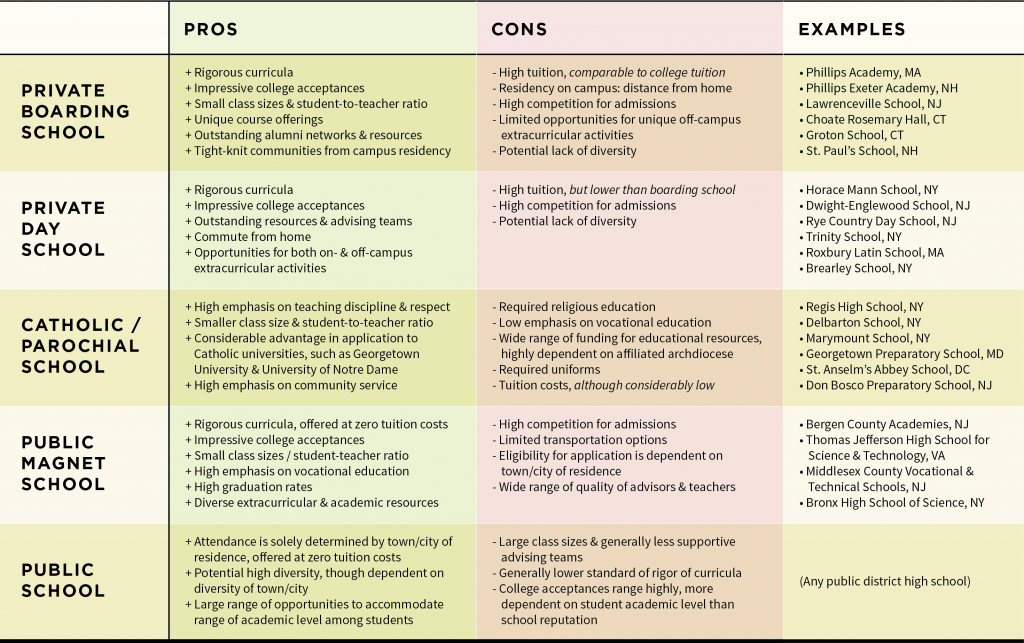
Which High School is Right For Me?
High school is the bridge to college, during which students build experiences and prepare the skills they need for their next phase in life. During high school, students learn, grow, and mature.
At least, that’s what’s supposed to happen.
As parents, we know that our children need to be in the best environment in order to receive the full effects and benefits of their education. But what we often forget is that the best environment for one child is not always the best environment for another. No matter how much data proves the greatness of one school, who knows? My child may become the outlier.
So how can you make sure that the school you choose is the right one for your student?
Types of High Schools
Before we go into what to look for in a potential high school, it’s important to go over the types of high schools and their strengths and weaknesses.

RIGOR OF CURRICULA & ADVISING TEAMS
Curricula rigor is one of the most important aspects to consider when selecting a high school. This rigor is what offers students the challenge that is needed for them to build the knowledge that can lead them to their future goals. In addition, this rigor is one of the biggest factors that colleges look at when evaluating a school and the standard of its students.
However, when considering rigor of curricula, you also need a discerning eye. Will the rigor be too much for my child? Will the rigor prohibit my child from pursuing other extracurricular activities?
Without the right support system, rigor of curricula can often be mutually exclusive of mental and physical health. It’s not a coincidence that private boarding and day schools that offer rigorous curricula are also equipped with outstanding advising teams to provide the support that their students need. On the other hand, the advising teams at public magnet schools run the gamut, and the quality of advising is often highly dependent on which advisor you are assigned.
One way to understand the rigor of the curricula is the average SAT and ACT scores in the school. A near perfect average score indicates that the majority of the students can take on the challenge of testing and rigor. A lower average score indicates that the school curriculum does not demand students to challenge their problem-solving skills. It may be easier to get a good GPA at the latter school, but it is important to strengthen foundational skills outside of school.
COURSE OFFERINGS, RESOURCES, AND STUDENT OPPORTUNITIES
Course offerings can range on a variety of scales. Most schools offer AP and/or IB courses, which are most indicative of students’ academic interests. They offer college credit upon passing of the courses, which is a large incentive: when carefully and strategically chosen, AP/IB credit can account for an entire term of college courses!
Private and magnet schools often offer unique courses as well, that can help students find their interests in a more focused manner. You could study the history and readings of horror literature in Blood Roots: Horror Literature and Its History at Phillips Academy Andover, or the culture and scholarship on female Black performers throughout history in From Bessie Smith to Beyonce at Phillips Exeter Academy. At the Bergen County Academies, you can join their student-run pharmaceutical company, Provita Pharmaceuticals, and develop solutions to real medical enigmas on either the research or the business side in Entrepreneurial Science.
Resources and student opportunities are often based on a strong alumni network. These opportunities include internships, research experience, and even special equipment to cater to particular academic interests. Internship and career opportunities are often best offered by magnet schools, as most magnet schools originated as vocational schools.
Schools in all five categories offer these resources and opportunities to varying extents. Make sure to research what options your child will have at each school, regardless of the type of school! Although this factor may be secondary to the rigor of curricula or reputation of the school, it is important to know whether your child will be able to make the best out of their time in high school.
COLLEGE ACCEPTANCES
Naturally, high schools that attract a higher caliber of students have more impressive college acceptances. But also consider that high schools that have historically sent students to a certain type of school will likely continue to send students to the same type of school. Let’s split this factor into the different categories:
Private Boarding & Day Schools
Parents who send their students to private boarding and day schools are often alumni of top colleges who know that they would like for their children to have the same or even higher education. This means that many students who go to these schools will have legacy at top schools, giving them a boost in their college applications. So even if you do not have legacy at a top university, you can still benefit from the legacy of your peers and upperclassmen, as they are part of the historical data that universities use to evaluate the school.
Catholic/ Parochial Schools
As reflected in the above table, the standard of education at Catholic/Parochial high schools varies by the affiliated archdiocese and degree of funding. Thus, it is difficult to say that they give a great advantage in college applications. However, students at Catholic high schools have a significant advantage over others when applying to Catholic or Jesuit universities, such as Georgetown University, University of Notre Dame, and Boston College, thanks to the Alliance for Catholic Education. This alliance between Catholic high schools and universities gives priority to students from Catholic high schools to admissions to Catholic and Jesuit universities, many of which offer top tier education.
Public Magnet Schools
College acceptances at public magnet schools vary highly, but are generally still quite impressive. Because most magnet schools in the country are focused on fostering STEM education, students often have an advantage at top tier STEM and engineering colleges and universities.
Public High Schools
Depending on the community in which they lie, some public high schools boast highly impressive college acceptances. However, college acceptances are highly dependent on student academic level, which runs parallel to the socioeconomic conditions of the community at large.
CLASS SIZE
In what kind of environment does your child learn most effectively: one-on-one, small groups of 8-10, or large groups? Large campuses often disorient students who have only been exposed to small class sizes, making them lose confidence. However, at the same time, these same students may be bored of the small class setting and may hunger for greater opportunities and adventure. Adventure is exciting! But both parents and students need to be ready for the risk and challenges that it brings.
Whether your child is used to the small or large group setting, you have to consider what they like or dislike about the classroom setting that they are exposed to and what more they want from their high school experience.
TUITION
How can we not talk about tuition?
The very presence of tuition fees makes attending private or parochial high schools, ultimately, a financial decision. The annual tuition of private boarding schools is comparable, and sometimes even more than, the annual tuition of a private college or university. While financial aid is provided, it is rare for a student to receive a full scholarship.
Also, considering that students move on to college after high school, and college tuition is another large obstacle, private or parochial schools may feel out of reach for many families.
If the advantages outweigh the large obstacle of tuition, then we say, go for it!
COMPETITION FOR ADMISSIONS
All high schools except for public high schools have a competitive admissions process that requires an application. Applications include letters of recommendation, student statements, parent statements, entrance exams, and transcripts. Applying for admissions to private high schools is just as competitive, if not more competitive, as applying for college admissions, and the process is just as time intensive.
However, through such a competitive admissions process, schools are able to gather a specific type of student body, comprised of students who will excel in their classroom. After students overcome the challenges of admissions, they are set on their 40 months to college success.
Get Started
For 4 years, 180 days a year, 6 hours a day, your child is in school, engaging with their peers and building experiences to help them grow. As parents, we dream that the last day of their high school career will be the first day of their independence, and they will set off, full of confidence and a strong foundation for their next chapter in life. But in order for them to do so, we need to have a discerning eye to determine what environment is best for them.
Interested in applying to a Private, Parochial, or Magnet school? Check out our High School Admissions Test Prep courses to get started.
Still don’t know where to start? Contact us today to set up a consultation with one of our experienced counselors and design your path to high school and college success today!



